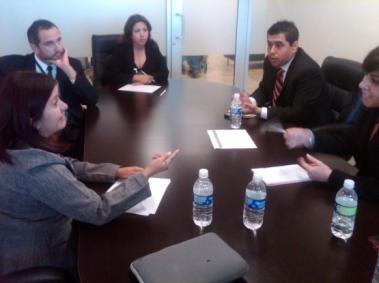
María and Juan Pablo* never imagined they would meet face-to-face and reconcile their past. They never dreamed they would find peace after tragedy.
For months, María had been obsessed with avenging the death of her 5-year-old son, who was killed in a hit-and-run accident in Mexico. She paid no heed to how her vengeful feelings were affecting her life. "I just wanted to find the person who had killed my son and make him pay," she said.
Fortunately, María decided on a different path. She forgave 21-year-old Juan Pablo for his role in her son's death, and set about rebuilding her life, thus preventing the cycle of remorse and revenge that can destroy societies.
The unlikely ending would not have been possible without the State System for Alternative Justice (SEJAP) in Mexicali, which brings together aggrieved parties, with the help of trained mediators, to seek reconciliation and reparation. USAID helped support the establishment of SEJAP, providing advice for the program's design and training for its mediators.
“SEJAP helped me to think differently, to let go of revenge, to arrive at a just solution," said María.
Inaugurated in Mexicali in July 2009, SEJAP has helped resolve more than 40,000 cases across Baja California. By taking on disputes that range from civil cases such as property damage, to minor crimes such as small-scale fraud, non-violent theft and hit-and-run accidents, SEJAP has radically reduced court backlogs. It has allowed judicial personnel to focus on the most serious crimes such as drug-trafficking, kidnapping and homicide.
The program is also empowering individuals to create their own solutions through controlled mediation, which furthers the sense of justice and rule of law. Mexico's ground-breaking transition from a written, inquisitorial criminal justice system to an oral, accusatory system that provides greater protection of rights began in 2008, and SEJAP is performing a vital role. Remarkably, criminals in Mexicali who participate in SEJAP are not repeat offenders.
"SEJAP provides lots of benefits,” said Kaleope Leal, an agent in the Mexicali Attorney General's Office, who oversees a team of mediators that has received extensive training in conflict resolution from USAID. "Apart from relieving the courts, it contributes to a culture of peace by bringing victims and their victimizers together, and helping them reconcile and transform crimes into something positive," she said.
That was certainly true for Juan Pablo, a young father who had been in a bad mood when he sped around a corner and accidentally struck María’s young child as he strolled into the middle of the street. Juan Pablo panicked and fled the scene. He abandoned his car and reported it as stolen, hoping the police would not trace it to him. Later, however, Juan Pablo sank into a deep depression. He suffered from insomnia and became obsessed with the need to turn himself in despite his own family's objections. He even secretly attended the child's funeral.
When the police finally picked him up, prosecutors recommended his case to SEJAP mediators. The most difficult stage was still to come. Over two months, Flor López, a social worker trained by USAID, worked with María and Juan Pablo separately to prepare them for when they would meet. For María, those sessions helped more than her previous appointments with therapists.
Lopez told María what happened and why Juan Pablo had abandoned the scene. She learned that Juan Pablo had never intended to hurt her son, but was stricken with fear at the scene of his crime, and had been paralyzed with guilt and remorse ever since. She learned to identify with Juan Pablo's suffering and let go of her anger.
When María finally met with Juan Pablo six months after the accident, her hatred was gone. She saw Juan Pablo as "utterly destroyed," and realized that she could have been the driver behind the wheel.
"I understood this could have happened to me, that I might have behaved the same way, and that I would gain nothing by killing him or seeing him in jail," said María. Juan Pablo, meanwhile, repeatedly begged for forgiveness and offered to pay María expenses for her son's funeral.
"Without the alternative justice system, these two people would have been in court for as long as two years and Juan Pablo would have faced a sentence of five to eight years in prison. Instead, Juan Pablo was able to ask for forgiveness, give back to María her sense of tranquility and security, and participate in a process of healing," said Leal.
María is now working to rebuild her life, repairing a separation the tragedy inflicted on her marriage. Juan Pablo, too, is beginning anew. His crime has been stripped from the record and he has returned to work, eager to appreciate his own family as much as possible.
* Last names withheld for privacy reasons.







Comment
Make a general inquiry or suggest an improvement.